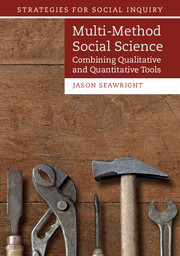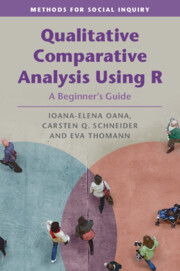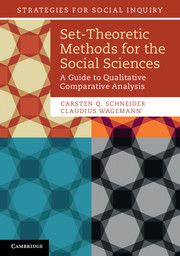Set-Theoretic Multi-Method Research
A Guide to Combining QCA and Case Studies
£70.00
Part of Methods for Social Inquiry
- Author: Carsten Q. Schneider, Central European University, Vienna
- Date Published: February 2024
- availability: Available
- format: Hardback
- isbn: 9781009307147
£
70.00
Hardback
Other available formats:
Paperback, eBook
Looking for an inspection copy?
This title is not currently available on inspection
-
A state-of-the-art comprehensive exposition of combining Qualitative Comparative Analysis (QCA) and case studies, this book facilitates the efficient use and independent learning of this form of SMMR (set-theoretic multi-method research) with the best available software. It will reduce the time and effort required when performing both QCA and case studies within the same research project. This is achieved by spelling out the conceptual principles and practices in SMMR, and by introducing a tailor-made R software package. With an applied and practical focus, this is an intuitive resource for implementing the most complete protocol of SMMR. Features include Learning Goals, Core Points, and Empirical Examples, as well as boxed examples of R codes and the R output it produces. There is also a glossary for key SMMR terms. Additional online material is available, comprising machine-readable datasets and R scripts for replication and independent learning.
Read more- A step-by-step introduction to the principles and practices of SMMR, starting with simple basic scenarios and ending with real-world complex examples
- Integrates conceptual and empirical examples and datasets from a wide range of social science disciplines, illustrating the relevance and application of SMMR for studying the social world
- Additional online R scripts and datasets are freely available at https://doi.org/10.7910/DVN/URMOVC
Reviews & endorsements
'Carsten Schneider has forgotten more about set-theoretic methods than you and I can ever hope to know. This book is the one you need if you are an (applied) researcher, looking to combine cross-case inferences and within-case analysis. It's so insightful you better not put it on the shelf but on your desk.' Bart Cambré, Professor Business Research Methods, Antwerp Management School and University of Antwerp
See more reviews'Combining QCA and case study tools has long been emphasized for stronger causal inference, but Carsten Schneider's book takes it to another level by developing a comprehensive approach for just how to do it right. Well-argued and chock full of insight, with many empirical illustrations, it makes a compelling case for multi-method research. I consider it required reading for anyone working in the comparative perspective.' Peer C. Fiss, Jill and Frank Fertitta Chair in Business Administration, University of Southern California Marshall School of Business
'This long awaited volume is a must-read for anyone striving to build on the respective strengths of QCA and case-based work. It enables the fruitful bridging of cross-case and within-case analysis by providing both a robust conceptual framework and technically precise protocols.' Benoît Rihoux, Full Professor, University of Louvain (UCLouvain), Belgium
'This much awaited book is an essential, incredibly useful resource for all scholars who seek to take cases seriously and improve their descriptive and causal inferences using set-theoretic methods in a systematic, rigorous, yet intuitive way. Seemingly effortlessly, Schneider takes case-oriented set-theoretic methodology to the next level while putting practice centerstage, so that the book is both cutting-edge and accessible, and speaks to readers with basic or advanced knowledge of set-theoretic methods.' Eva Thomann, University of Konstanz
Customer reviews
Not yet reviewed
Be the first to review
Review was not posted due to profanity
×Product details
- Date Published: February 2024
- format: Hardback
- isbn: 9781009307147
- length: 276 pages
- dimensions: 235 x 159 x 21 mm
- weight: 0.53kg
- availability: Available
Table of Contents
Preface
1. Introduction: SMMR in a nutshell
2. Basics of SMMR
3. Disjunctions
4. Conjunctions
5. INUS conditions
6. Necessary conditions
7. Conclusions and outlook
Appendix: Principles
Glossary.-
General Resources
Find resources associated with this title
Type Name Unlocked * Format Size Showing of
This title is supported by one or more locked resources. Access to locked resources is granted exclusively by Cambridge University Press to lecturers whose faculty status has been verified. To gain access to locked resources, lecturers should sign in to or register for a Cambridge user account.
Please use locked resources responsibly and exercise your professional discretion when choosing how you share these materials with your students. Other lecturers may wish to use locked resources for assessment purposes and their usefulness is undermined when the source files (for example, solution manuals or test banks) are shared online or via social networks.
Supplementary resources are subject to copyright. Lecturers are permitted to view, print or download these resources for use in their teaching, but may not change them or use them for commercial gain.
If you are having problems accessing these resources please contact [email protected].
Sorry, this resource is locked
Please register or sign in to request access. If you are having problems accessing these resources please email [email protected]
Register Sign in» Proceed
You are now leaving the Cambridge University Press website. Your eBook purchase and download will be completed by our partner www.ebooks.com. Please see the permission section of the www.ebooks.com catalogue page for details of the print & copy limits on our eBooks.
Continue ×Are you sure you want to delete your account?
This cannot be undone.
Thank you for your feedback which will help us improve our service.
If you requested a response, we will make sure to get back to you shortly.
×



